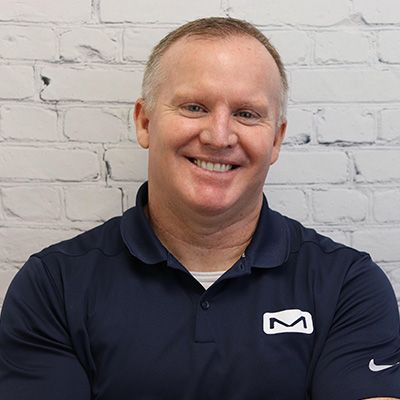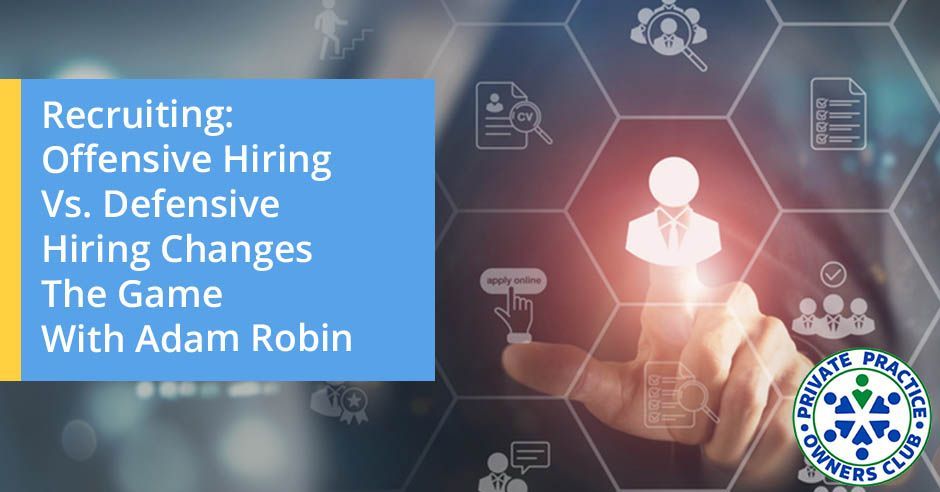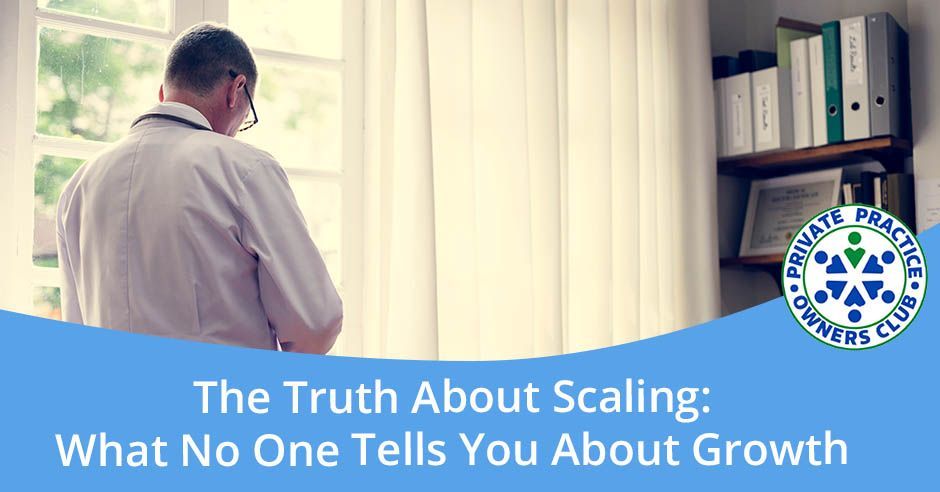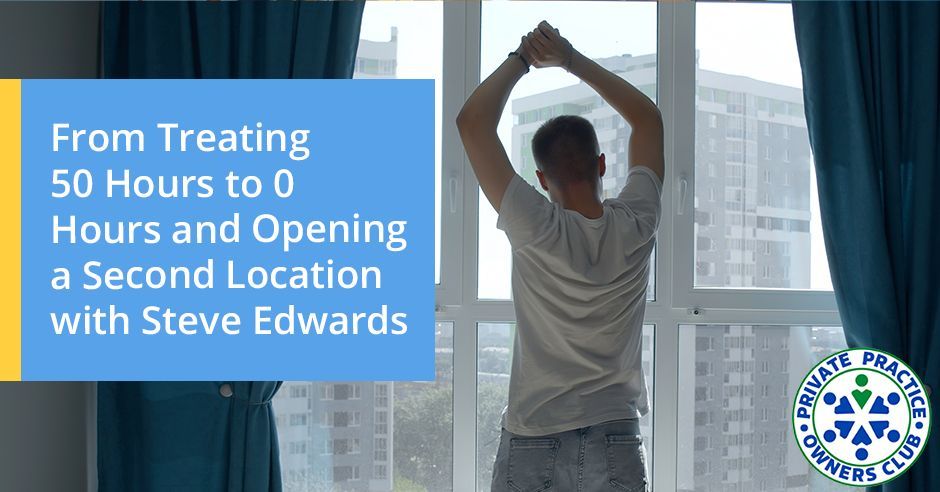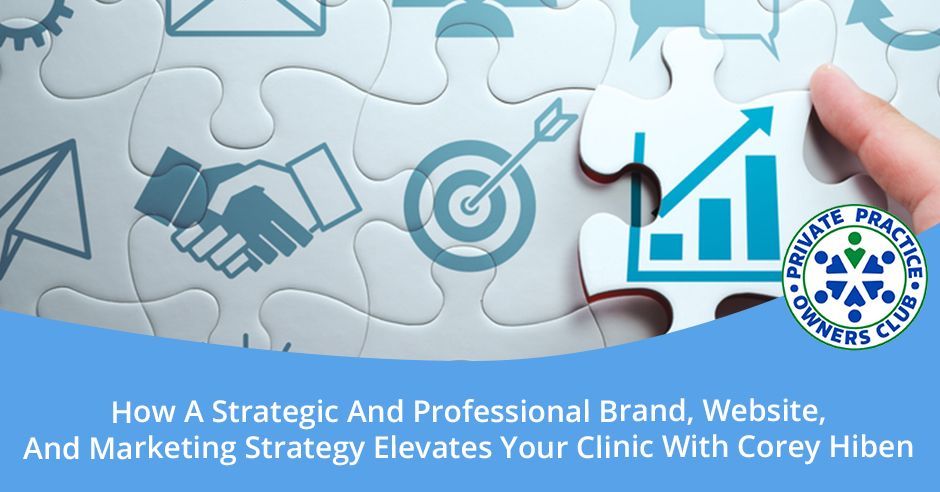Marc Moore founded Moore Physical Therapy in 2002 at its current location. He was born and raised locally in Mesa, Arizona. He Graduated in 1999 from Northern Arizona University with his Masters in Physical Therapy. He has been actively involved in the East Valley as a community volunteer. His love is, spending time with his wife Michelle cheering on his 5 children in their various pursuits. Personal interests include coaching, running, camping, travel, and fishing.
Successfully Dropping Low-Paying Insurances With Marc Moore, PT

What if dropping your lowest-paying insurance could lead to higher profits and better patient care? Marc Moore shares how dropping low-paying insurance became his day of liberation.
Join Nathan Shields on the Private Practice Owners Club Podcast with Marc Moore, CEO of Moore Physical Therapy, about how his decision to drop low-paying insurance drastically improved his Practice’s profitability.
Episode Highlights:
- The Breaking Point: Marc discusses the pivotal moment when he chose to stop accepting a long-standing low-paying insurance plan.
- Financial Impact: How Marc’s practice saw a net gain in profitability by cutting low-reimbursement plans.
- Team Alignment: The journey of aligning staff on why low-paying insurances limited their growth and the level of care they aimed to provide.
Don't miss this episode of the Private Practice Owners Club Podcast – whether you're just starting or thinking about your next step in scaling your practice.
Want to talk about how we can help you with your private practice, or have a question you want to ask? Book a call with Adam - https://calendly.com/adamrobin/dr-adam-s-30-minute-connection
Love the show? Subscribe, rate, review, and share! https://ppoclub.com
---
Listen to the podcast here
Successfully Dropping Low-Paying Insurances With Marc Moore, PT
Introduction To Marc Moore And His Journey
I’ve got my good friend, Marc Moore, from Moore Physical Therapy, Founder and CEO, who is also a good friend of mine being in the physical therapy school at NAU Physical Therapy Program back in the day. That was a couple of decades ago. It’s been a long time.
1996.
Our graduation was in '99.
Yeah, we met in ‘96.
I aged myself.
You were married. You were a single guy.
That's right. Thanks for joining me again. I’ve had Marc on the show before, and it's good to have you back. Thanks for coming back. I’m excited to bring you on because it was a couple of years ago that you and I started having conversations. You were seriously looking at how to increase your average reimbursement rate and one way to do that. I know you’ve done some other things, maybe you’ll share with us in terms of negotiating with insurance companies. In this particular situation, why I wanted to talk to you because you were seriously looking at dropping United Healthcare, one of your lower payers. Give us a little backdrop on that. What led you to the idea that you seriously need to consider this action?
This will be no surprise to anybody in the space, both the fact that they wouldn’t pay a reasonable amount and their administrative burden was so high. That's the formula for us to drop insurance with the highest admin coupled with the lowest pay. We have now dropped two insurances both United Healthcare. It was the day of liberation.
I've always had a with United Healthcare about how they would operate. They’ve gotten a lot worse with all their authorization requirements. It's been so nice to be like, “That doesn’t apply to me.” We also got rid of one of our Medicaid options here in the state of Arizona, and it was the same thing, especially heavy on the administrative burden.
We got to the point where we said, “With United Healthcare, the plan would be to see two patients every 30 minutes to make it worth it.” As we sat down, we decided, “This is not who we are.” We don’t want to be McDonald’s. No dig on McDonald’s but we don't want to crank this out. We want to be like Red Robin. We want some automation and systems in place. We don’t want to be a mom-and-pop either, but we don’t want to crank out double the notes and other things that go along with that.
Balancing Values And Profitability
Our concern and I don’t think any of your readers will be like, “That surprises me.” Are the doctors going to go, “I’m not going to send you over there now because they have to choose, do they take this insurance? Do they take that insurance?’” That was a big concern. I felt like we should have done it several years earlier. Now that I have done it. We should have done it years ago. We probably should have done that maybe sooner, but other people did. Other people were much more pioneers than I am. Those were the big decisions. Another concern was the loss of relationships with patients who love you and they love you.
That’s the bitter pill to swallow because the first concern about the doctors has not turned out to be the reality. When I told my doctors, the ones with whom we have relationships, they were like, “I wish I was as brave as you. I need to drop this and that. I respected their decision. I understand that. It hasn’t been a big worry.
Doctors have not turned out to be the reality of things. The reality is those dollars.
When you were initially looking at the numbers, in Arizona, the flat rate was $65 or $75 or something like that.
$65.
Your cost to see that patient per visit was significantly higher, I’m assuming?
Yeah.
It’s probably close to $20 more than that per visit. I have it before, you just as easily hand that patient a $20 bill as they walk and let them, and it would be about the same out of the value that you provide. Financially, it’s about the same as doing that.
There was a guy who was saying, “Why are you doing this?” I’m like, “This worry and that worry,” and he goes, “I want you to do something. Go home tonight, sit at your dinner table, I want you to look over at your family, and tell them, ‘I saw X number of patients and lost $20 for each one of them coming in.’” I did it. I sat down with my daughter, who was seventeen years old, and looked at me. It’s like, “Why, Dad?” I was like “I don’t know.” There was no good reason. I was just afraid of change, afraid of the unknown.
Role Of Mentors
It’s wonderful to have coaches and mentors like that who are outside our bubble. They don’t understand our worries, concerns, and excuses, and for them to put it like that and for you to face that and provide a valid excuse that doesn’t land with them. It was a hugely valuable exercise.
My daughter is like, “I don’t get it.” I don’t either. Your dad is an idiot.
You’re speaking to the industry at large, to private practice owners who somehow manage to do the mental gymnastics to make it work. They think, “Other people need you,” or have to see that in you. I don’t agree with it, but as a newer owner, taking some of those contracts could be worth it because you’re trying to fill spots and will have this minimum level of overhead anyway. You might as well take the added revenue because your expense line is going to stay about the same, whether you take them or not. I can maybe grasp onto a little bit of that.
At this stage, you’ve already got three clinics going. You’re relatively productive across three clinics, you are profitable across the three clinics in total. I spent probably a few hours on a screen share, if you recall, looking at your numbers specific to this one insurance. I remember looking at your payer mix by percentage, and if you recall, United Healthcare compared to your total visit number was 10% to 15% percent. Do you recall approximately what revenue percentage equated to the revenue from those insurance visits compared to the actual visits of 12%?
You were the first one to point that out to me and say, "Look at this. It's not like you are going to lose 15% of your income. You are going to lose this lower amount of your income, they are going to lose 15% of the work you do." That was a shift in my thought too, like I thought about it that way. It's another reason to do it.
When I talk to people about it, usually that number falls somewhere around there. Somewhere around 10% and could be as high as 20% of their hair mix in visits. When you look at the financial impact of dropping that insurance, that being 10% to 12%, was there any way that made it a little bit easier to swallow like, "We could find ways to make up the 10% in revenue that's going to be lost."
You couple that with the fact that some of those United Healthcare patients I'm now seeing still because their plan was such that they didn't have any different financial impacts out of pocket for an out-of-network versus an in-network. We retain I don't know this exactly, but I would say probably somewhere in the neighborhood of 5% to 10% of people or healthcare. United Healthcare pays nicely out of network. They are now our best payer. We now love United Healthcare out-of-network. I haven't done that math exactly, but how much of that 12% that we were financially losing did we gain back? Is it another couple of percentage points probably? Maybe we are down to only 9% or 8% of a loss financially.

Looking at the big picture, I know you don't have the numbers in front of you but a year after making that decision was it an overall net loss or net gain to your profit margin by dropping that insurance?
It was a gain. We found other ways.
Get scheduled with higher-paying insurance.
We are in the process of maybe we took a little longer to hire. Maybe we didn't grow quite as fast, but we were on the positive side of all the visits. Our per-visit count goes up.
Your profit margin goes up.
It didn't hurt us.
People say this all the time on shows, and in this situation, it's appropriate. I don't like to ask it very often, but in this situation, what would you go and tell Marc from two years ago, who was in that fearful situation? What would you tell him?
I would say, "Don't be silly. Don't continue to do what you know you shouldn't. Don't be afraid of the devil you know versus the devil you don't." It's all a fight. It's a battle. You have to get up every morning and try to solve your next problem but if you know you have a problem, then at least all the ones you know what it becomes. I knew this was an issue. On top of all that, I didn't feel like, principal-wise, I was doing the right thing. Like somebody else would say, "I dropped them a long time ago.” That's not an acceptable amount to get paid. I'd be like, "I wish I was that guy. That guy is greater than me. As a principal, it's true that it’s not right that we are accepting that as an industry. I'm like, "Yeah, but I gotta pay the bills." It's not true.
There's some disconnect or dissonance in our logic because, without the numbers in front of you, it's easy to make up some stories like, "This is going to severely impact me financially. This is going to impact my reputation because I'm not taking X insurance, and the physician groups are going to be upset about it." That's the story we tell ourselves and you found out that those things were lies.
What you said is accurate. Lying to yourself. I was lying to myself, but the biggest challenge I had with my staff was saying to my staff, "We are going to drop this insurance," because they were like, "Wait a second, what was that impact?" Once they saw those names, those individuals because now I'm not directly in the clinic treating patients.
I know some of those individuals from when I was years ago. It’s not my buddies that I'm going to see day in, day out, week in, week out. That was hard. It was hard to tell my staff, "I'm sorry, but you are going to have to tell these people." In all the cases but primarily on Medicaid insurance. We said, "We are going to time this in October when that deductible re-ups. We timed it to be around August, and we started notifying them, saying, "We are dropping this." We dropped it in early September and said, "If you can switch over to another plan," and we had a number of them that did.
Was it the time to re-up their Medicaid plans? We could retain them as patients. They got what they wanted, which was to stay with us and the care we were giving, but they switched over to this other plan, which was an acceptable payer for us. There are some acceptable payers. “Here are the ones that we will take,” and so that was a good situation for us.
That's a little bit of a different situation in the state of Arizona because not all states have third-party Medicaid providers like that. In a state like Alaska, you either have Medicaid, or you don't but in Arizona, they farm that out to third-party insurance companies that can run their insurance programs for them, so the Medicaid clientele has a choice between different Medicaid programs. I do have to throw that out there.
Dropping Low-Paying Insurances
Talk to me a little bit about that because one of the first steps that I see if you are going to drop an insurance plan is, you have to be clear between and that has to glow into your team that provides such value for your patients that taking this insurance goes against our values. I know that's an exercise, or conversation at least that you had to have with your team for them to be on board and to get over this idea that we are going to be martyrs, we are going to sacrifice, we are going to take the financial hit to see this insurance company for the benefit of our patients. Rather, taking a stand and saying, "No, we provide X value,” and it goes against our values to accept this insurance." How was that conversation? What about exercise?” It looks like how did you get on the same page with your team so that they also now believe that there's no way we should accept this insurance? How did that go about?
It's a great question because that was the thing I spent the most time on. I showed them. I said, "We do have options, and everything in life has options. In the United Healthcare's case, these are per diem patients we can see however many hours we want." We could do this and lay that out, or we could do this other. Laid out the whole picture of what this would mean, what this would look like for you.
Everything in life has options.
To share with them? I don't want to cut you off, but did you share with them some of the same numbers that you and I were looking at? Like they understood that we were losing money.
What we get paid, what it costs us to deliver care. We'd have to get up to here to make a profit. I know you guys want something I want. You want to be able to increase your pay year over year. You want to be able to have additional benefits in the company and there are all these things that we would love to have, and those things become affordable when we increase our pay-per-visit to this level. This is the impact. This is having on us negatively. We have to do something. Choose this or maybe you could come up with an idea that I haven't thought of. Bring them into the discussion and have them propose ideas. Then talk about what that would mean for their idea. It was very clear that in our organization, the choice was to do this even though it was hard.
You had to get your team on the same page and understand that we provide such a value that taking this insurance is not a benefit to the company, not to the owner, not to the company, not to them because it's going to infringe on your ability to provide them benefits or raises. What was the overall message, then? What did you have to say to the patients? I'm sure you guys came together and had to come up with a unified story as to why you were dropping it, and what that looked like.
We made sure that we gave some notice, so the patients weren’t left high and dry. We explained to them that they have other options that we can still, we see them on an out-of-network basis, and that we will be telling them exactly what that would look like for them financially. We did the work to look at what their out-of-network benefits were, and then said, "Here are your options. This is what it’ll cost if you continue on an out-of-network basis." This will cost you. Here are some of the local options they had nearby.

We think that this physical therapy fit over here would be a good decision if that's what you choose to do. There was one individual that was particularly tough to see him go. He’d been with us for a while, and the physical therapist went with this individual to his first physical therapy appointment at the new facility. They handed him over and said, "Everything's going to be fine," sat in the room with him, and I was over at the office the other day when he came in.
It had been like a year since they’d seen him in the office. He came in and everybody got up and ran to him and hugged him. They missed him so much, and he was like, "I'm doing good." He was coming back in to say, "I miss you guys." He’d had a good experience which was great. He was getting the care he needed, which was a big concern for our front office. It gave them that peace of mind that we took care of this individual’s needs as best we could, and they are getting the care they need elsewhere.
Did you lay out a reason as to why you were dropping the insurance with those patients? Did you spell out the financial impact or whatnot? Did you share some of that?
We can’t afford to provide the time and care that we give based on what we’re. A lot of people have been to other physical therapy facilities, and they have sensed that what we do at ours is maybe a little different. These guys spend more time with me than my other experiences." It's not a difficult thing to say, "The additional time and effort and staffing that we have here to make sure that we are one-on-one with you is a different model than having you do your exercises nearby and watching from a distance," which is another model and that’s two different things. If you want this, what we do, we can no longer get paid by your insurance company because they don’t pay us enough. We were straight up with that.
You were very clear that it's not affordable based on the experience that we want to provide and the customer service that we want to provide. We can no longer accept this insurance plan so it was pretty cut and dried. You didn’t, it sounds like wordsmithing too much. You were pretty straightforward but it sounds like your team also had that same story. That’s an important part as someone’s dropping insurance, the message has to be unified between everybody because the last thing you want to see is a patient that talks to, say, a technician and gets one story, talks to a provider, gets a different story, and then talks to the front desk and gets a different story. You guys had to be all on the same page to make this go.
That was an area that you advised me on, and it was something we focused on because of that. You helped me think about that beforehand. I went to my clinic directors, and I said, "Imagine if " I gave them that scenario and said, "What would this look like?" They were like, "We better make sure that we communicate the same thing across all three clinics and across all employees." I don't think we are perfect at it, but I don’t think we are perfect at most things, but we did well. All of the difficulty was pretty much dropped.
After dropping it, the backlash wasn’t as severe as you imagined.
When it was over, yes.
All that work on the front end kind of minimized that concern on the back end, that backlash. How long did it take for you to say that was a positive decision? Was it before the actual contract end date, or was it sometime after that?
I felt like all my team was on the same page.
Before the 90 days or 60 days, whatever it took to be up, you felt like that was a positive decision. No matter what the financial impact was after the fact, that didn't take months after that to figure out.
That would be a fair statement. I never thought about it that way, but in retrospect, it was a good decision and I knew it before the 24th of May hit.
How long was it before then that you decided to drop the other insurance plan?
The other one took about a year. I dropped the other one and why did it take that long? I didn't jump to it. I don't think I should have done it more immediately. These are much smaller, this represented 1% or maybe 2% of All of ours, and so that was easy to get back-burnered. The thing that held me up, probably for both of these, was not having my contract in hand.
I was standing off to this health plan saying, "Can you send me my contract? I don't have it here," having to wait to get that back from them, and all that stuff was an additional time frame and so that's one thing I'm trying to do now, have all my contracts in a folder so that anytime I want to pluck it out. I'm into that point. I have increased payment in three insurance plans through simple negotiation.
That was going to be my next question before you jump into that. Did you try to negotiate with either of these plans? Which ones?
Did you get negative responses both times?
Healthcare was like, just not going to happen like no interest, no negotiation. The other one came back and increased what they were paying by $20 per visit. I said, "We are still below where I need to be," and we still agreed to disagree, and I dropped it.
Like United Healthcare, did they have a significant administrative burden as well?
If United Healthcare would come back, 85% would have taken that.
Way more. They had to get way higher than what you were collecting per visit to be worth it considering that.
These people came back and said, "$85," and we said, "With your administrator, it needs to be $100 to visit."
I'm assuming I don't know your numbers, but I'm still thinking $85 is close to the cost per visit for you.
We would have taken it still. We would still have done it.
Are you okay with the United Healthcare side?
I think we would.
That's fine. No judgment.
You can get your per-visit cost down to $60 if you are productive. It's not all a bad idea then.
If you've got your team being super productive, the expense rate stays the same while you are seeing more visits, and then your cost per visit goes down. I get it. That means you have to push production and make sure that's humming.
You can't have gaps in your schedule. You have a waitlist. You've got to be back for the most weight. Those people, when cancellations come, these are doable. Every winter here in Arizona, everybody does. You get so busy, that you can't see everybody, and then in the summer, it's a little softer.
Negotiation Skills And Financial Wins
I do want to get into the negotiation part, but did you find that your confidence in dropping some of these insurances increased because of your initial experience?
Yeah.
You are on the hunt a little bit to either negotiate or drop them, it sounds like, right? Since then, you've had greater confidence in negotiating, and you've had some wins.
When they come back and say, "We'll pay you $85 versus $65," and I say, "You've got to get here," and they say, "No," I say, "We are going to drop you." Of all the variables, it was such a small 2%. With these others, especially with workers' comp, the third-party administrators are making so much money. There is so much room there.
I sent it back for a second time. I said, "We want to get paid $120," and they came back and said, "Right now, we are getting $90." They came back and they said, "We will do $95," and I said, "That's great. That's a good win. That's profitable." Then I said, "We want $100," and they came back and said, "We will do it." It wasn't that hard. It was a matter of waiting two weeks between responses and the specification. That happened with our significant third party.
[inaudible] them too. They came back, and we said, "We want this," and it was the same thing, going back and forth three times, and we ended up increasing that one. I’m in conversation with Blue Cross Blue Shield. Their methodology I have been through this before with them a few years ago and didn’t get any adjustment. They are asking the same sets of questions, and their methodology isn’t just asking, they'll tell you. Theirs is, "Answer these questions and establish how you are different," and they want you to please your case. Still midway through that.
We don’t have time to get into the details of how you negotiated and whatnot. Frankly, that's a different episode altogether.
I don’t think I’m the best at it.
You tried. You are reaching out, you are talking to the contract service providers. You are trying to negotiate with people and not sitting around, which is awesome.
That’s the difference maker. When you make a couple more dollars per visit, that's a big difference.

It goes right into your pocket because the expense line should stay the same. You get another $10 per visit, extrapolate that over the course of a year, and the number of visits that you see that's added profit. You can do a lot for your employees, for your family, and for your business expansion, because you made a big difference.
I don’t think any organization would say that was a bad decision. Everybody would be like, "That was the right thing to do."
You started with Blue Cross Blue Shield a few years ago. They didn’t make any changes back then. They might now, but now that you’ve been through United Healthcare, Medicaid, and the renegotiations part, what has been the difference in your average reimbursement per visit over the course of the last several years?
About a 10% increase or so that's 10%.
The numbers that I saw. It's at least 10%.
We are heavy on Medicare, so before these last six years of cuts, we were around 100. Then it steadily decreased to the mid-90s, and now we are up to $106 or $107. A little around $10.
These are the things that you have to do as an owner to combat inflationary pressures, decreasing reimbursements, and that stuff. This is the stuff you've got to start doing. You can't sit by passively, idly by, and expect things to continue to go honky-dory.
The “Watermelon Truck” Analogy
When I was explaining this to my staff, I used the Watermelon Truck story. A man buys a truck, fills it with watermelons, and sells them for $1 a melon. He buys them from the grower for $1 a melon and sells them to the customer for $1 a melon. He looks back and says, "I’m not doing so well. I haven’t made any money. I know the solution. I need a bigger truck," and so that is what you feel like when you are seeing some of these low payers. It's like, "I need to see more of these people." No, you don’t need a bigger truck, you need to sell your melons for more than they cost you to make.
I love that you are ending that story because that’s the perfect analogy for our profession. Thanks for sharing. I appreciate you taking the time. This was an awesome conversation. Thanks, Marc.
Thank you.



